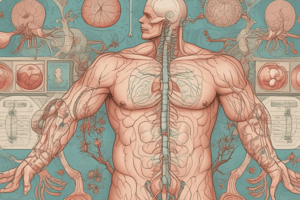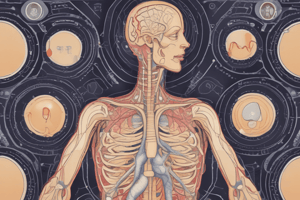Podcast
Questions and Answers
What is the primary function of the pituitary gland in the endocrine system?
What is the primary function of the pituitary gland in the endocrine system?
- To produce insulin and regulate blood sugar levels
- To regulate metabolism and energy production
- To produce sex hormones and regulate reproductive functions
- To regulate other endocrine glands and produce hormones that stimulate or inhibit hormone production (correct)
Which hormone is responsible for regulating blood sugar levels?
Which hormone is responsible for regulating blood sugar levels?
- Cortisol
- Thyroxine (T4)
- Insulin (correct)
- Adrenaline (Epinephrine)
Which gland is responsible for regulating stress response?
Which gland is responsible for regulating stress response?
- Adrenal gland (correct)
- Pancreas
- Thyroid gland
- Pituitary gland
What is the primary function of glucagon?
What is the primary function of glucagon?
Which hormone is responsible for regulating growth and development?
Which hormone is responsible for regulating growth and development?
What is the term for an overactive thyroid gland?
What is the term for an overactive thyroid gland?
What is the term for an underactive thyroid gland?
What is the term for an underactive thyroid gland?
Which of the following is a function of the pancreas?
Which of the following is a function of the pancreas?
Flashcards are hidden until you start studying
Study Notes
Overview
- The endocrine system is a network of glands and organs that produce and regulate hormones in the body
- Hormones are chemical messengers that control various bodily functions, such as growth, development, and metabolism
Major Endocrine Glands
- Pituitary Gland:
- Located at the base of the brain
- Regulates other endocrine glands
- Produces hormones that stimulate or inhibit hormone production in other glands
- Thyroid Gland:
- Located in the neck
- Produces thyroxine (T4) and triiodothyronine (T3) to regulate metabolism
- Regulates growth and development
- Adrenal Glands:
- Located on top of the kidneys
- Produce hormones such as adrenaline (epinephrine) and cortisol to regulate stress response
- Regulate blood pressure, electrolyte balance, and glucose metabolism
- Pancreas:
- Located behind the stomach
- Produces insulin and glucagon to regulate blood sugar levels
- Regulates digestion and nutrient absorption
- Ovaries (in females) and Testes (in males):
- Produce sex hormones (estrogen and progesterone in females, testosterone in males)
- Regulate reproductive functions and development
Hormones and Their Functions
- Insulin:
- Regulates blood sugar levels
- Facilitates glucose uptake in cells
- Glucagon:
- Raises blood sugar levels
- Stimulates glucose release from stored glycogen
- Adrenaline (Epinephrine):
- Stimulates "fight or flight" response
- Increases heart rate, blood pressure, and energy levels
- Cortisol:
- Regulates stress response
- Helps body respond to stress, inflammation, and infection
- Thyroid Hormones (T4 and T3):
- Regulate metabolism and energy production
- Influence growth and development
Endocrine System Disorders
- Diabetes:
- Insufficient insulin production or insulin resistance
- High blood sugar levels
- Hypothyroidism:
- Underactive thyroid gland
- Slowed metabolism, fatigue, and weight gain
- Hyperthyroidism:
- Overactive thyroid gland
- Rapid heartbeat, weight loss, and anxiety
- Cushing's Syndrome:
- Overproduction of cortisol
- Weight gain, high blood pressure, and mood changes
Overview
- The endocrine system produces and regulates hormones that control various bodily functions
- Hormones are chemical messengers that regulate growth, development, and metabolism
Major Endocrine Glands
- Pituitary Gland: regulates other endocrine glands, located at the base of the brain
- Thyroid Gland: produces thyroxine (T4) and triiodothyronine (T3) to regulate metabolism, located in the neck
- Adrenal Glands: produces hormones like adrenaline (epinephrine) and cortisol to regulate stress response, located on top of the kidneys
- Pancreas: produces insulin and glucagon to regulate blood sugar levels, located behind the stomach
- Ovaries (in females) and Testes (in males): produce sex hormones, regulate reproductive functions and development
Hormones and Their Functions
- Insulin: regulates blood sugar levels, facilitates glucose uptake in cells
- Glucagon: raises blood sugar levels, stimulates glucose release from stored glycogen
- Adrenaline (Epinephrine): stimulates "fight or flight" response, increases heart rate, blood pressure, and energy levels
- Cortisol: regulates stress response, helps body respond to stress, inflammation, and infection
- Thyroid Hormones (T4 and T3): regulate metabolism and energy production, influence growth and development
Endocrine System Disorders
- Diabetes: insufficient insulin production or insulin resistance, high blood sugar levels
- Hypothyroidism: underactive thyroid gland, slowed metabolism, fatigue, and weight gain
- Hyperthyroidism: overactive thyroid gland, rapid heartbeat, weight loss, and anxiety
- Cushing's Syndrome: overproduction of cortisol, weight gain, high blood pressure, and mood changes
Studying That Suits You
Use AI to generate personalized quizzes and flashcards to suit your learning preferences.



